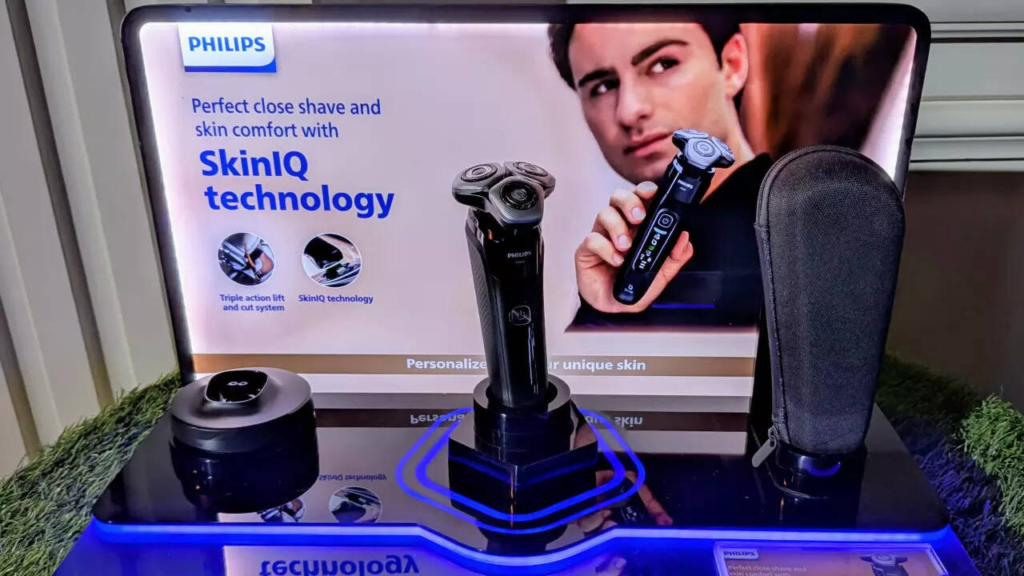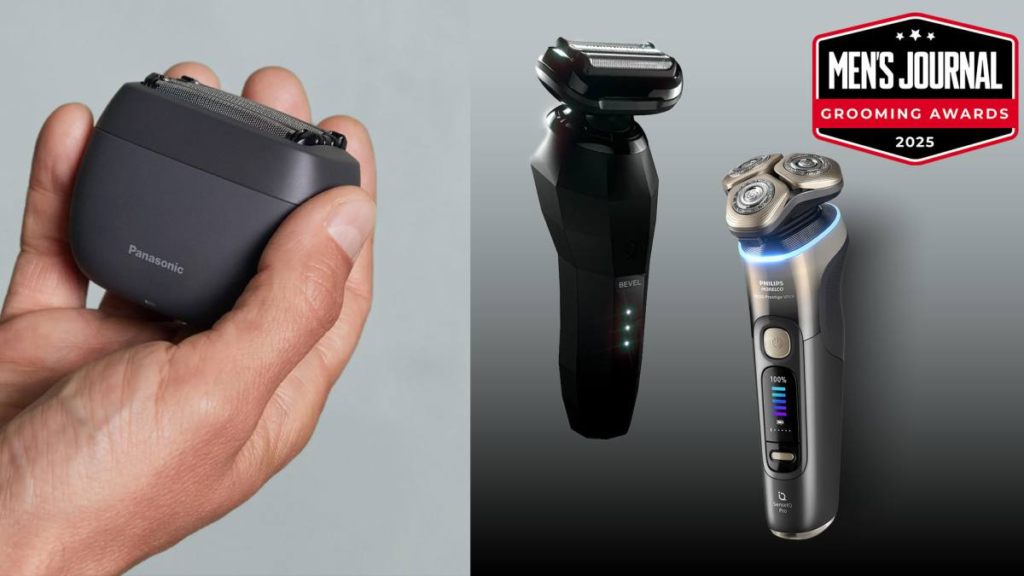In recent years, the skincare and grooming industry has undergone a significant transformation, driven by advancements in artificial intelligence (AI). Among the standout innovations are AI-powered skincare devices, such as Philips shavers, which are designed to cater to diverse skin types. These cutting-edge tools promise personalized grooming experiences, prioritizing comfort, precision, and skin health for users across the United States. From sensitive skin to coarse facial hair, these devices are redefining how Americans approach their daily grooming routines. This article explores the rise of AI-powered skincare devices, with a focus on Philips shavers, their benefits for diverse skin types, and the broader impact on the grooming industry.

The Rise of AI in Skincare and Grooming
The integration of AI into skincare and grooming devices is not just a trend but a game-changer. AI technology allows devices to analyze skin and hair characteristics in real time, adapting to individual needs for optimal results. In the U.S., where consumers increasingly demand personalized solutions, AI-powered devices are gaining traction. These tools go beyond traditional grooming by offering tailored experiences that address specific concerns like irritation, ingrown hairs, or uneven shaving results.
Philips, a global leader in health technology, has been at the forefront of this revolution with its AI-powered shavers, such as the Philips Norelco Shaver i9000 Prestige Ultra. Launched in May 2025, this shaver incorporates advanced SkinIQ Pro technology, which uses AI to analyze beard density and skin conditions, adjusting cutting power and shaving modes for a customized experience. According to Philips, the i9000 Prestige Ultra can measure hair density 500 times per second, ensuring a close, irritation-free shave for various skin types, including sensitive, oily, or combination skin.
The demand for such innovations is evident in the U.S. market, where the male grooming industry is projected to grow significantly. A 2024 report by the IMARC Group noted that the Indian male grooming market alone reached $2.3 billion, with similar growth trends observed in the U.S. as consumers invest in high-end grooming products. Philips’ premium shavers, priced up to $749.99, reflect this shift toward premium, tech-driven solutions that cater to diverse needs.
How AI-Powered Shavers Address Diverse Skin Types
One of the biggest challenges in grooming is accommodating the wide range of skin types and hair textures found among American consumers. From African American men with curly, ingrown-prone hair to individuals with sensitive skin prone to razor burn, traditional shavers often fall short. AI-powered devices like Philips shavers are designed to overcome these challenges through intelligent features.

The Philips Norelco Shaver i9000 Prestige Ultra, for example, features a Triple Action Lift & Cut Technology that lifts hairs from the root for a close shave without tugging or irritation. This is particularly beneficial for coarse or curly hair, which is common among African American men and can lead to ingrown hairs if not handled properly. The shaver’s Hydro SkinGlide coating reduces friction by 50%, minimizing irritation for sensitive skin types. Additionally, the device’s 360-degree Precision Flexing Head adapts to facial contours, ensuring even contact across all skin types.
For women, Philips offers the Beauty Lady Electric Shaver 6000, which includes a single floating foil blade and a skin-stretcher cap to gently lift hairs for a smooth, nick-free shave. This device is ideal for sensitive areas like underarms or the bikini line, catering to diverse skin sensitivities.
These features make AI-powered shavers versatile tools for the multicultural U.S. population, where skin types range from dry and sensitive to oily and combination. By analyzing skin and hair in real time, these devices ensure a comfortable grooming experience for everyone.
Beyond Shaving: The Broader Impact of AI in Skincare
While Philips shavers are a prime example, AI-powered skincare devices extend beyond grooming tools. Companies like SmartSKN Labs are pioneering AI-driven skincare robots that create personalized formulas on demand. These “mini smart factories” allow users to select base formulas and active ingredients tailored to their skin type, addressing concerns like acne, dryness, or pigmentation. This technology aligns with the growing U.S. trend of customized skincare, where consumers seek data-driven solutions for their unique needs.
Similarly, platforms like Haut.AI’s SkinGPT are pushing the boundaries of AI in dermatology. By simulating the effects of skincare ingredients and educating users about environmental factors like UV exposure, these tools empower Americans to make informed decisions about their skin health. Such innovations complement AI-powered grooming devices, creating a holistic approach to skincare that prioritizes personalization and sustainability.
Why AI-Powered Devices Are Gaining Popularity in the USA
The U.S. grooming market is highly competitive, with brands like Braun, Remington, and Panasonic vying for consumer attention. However, Philips stands out due to its focus on AI and skin-friendly features. The Philips Norelco 9800, praised for its seamless gliding and 360-degree rotation, is a top choice for those with curly or coarse hair, while the OneBlade Pro 360 is lauded for its versatility and affordability, making it accessible to a wide audience.
Several factors contribute to the popularity of these devices in the U.S.:

- Personalization: AI technology allows devices to adapt to individual skin and hair types, meeting the diverse needs of American consumers.
- Convenience: Features like wet and dry functionality, quick-charge options, and app integration (e.g., Philips’ GroomTribe app) make grooming effortless and efficient.
- Sustainability: Initiatives like Philips Fixables, which allows users to 3D print replacement parts, appeal to eco-conscious consumers who value product longevity.
- Comfort and Safety: With features like reduced friction coatings and intelligent sensors, these devices minimize irritation, making them ideal for sensitive skin.
The rise of e-commerce platforms like Amazon, which recently hosted its Ultimate Brand Sale with up to 60% off on Philips and other brands, has also made these devices more accessible to American consumers.
Challenges and Future Outlook
Despite their benefits, AI-powered skincare devices face challenges. High-end models like the Philips i9000 Prestige Ultra are expensive, with prices ranging from $479.99 to $749.99, which may deter budget-conscious consumers. Additionally, not all Americans have access to 3D printers for initiatives like Philips Fixables, limiting the program’s reach.
However, the future looks promising. As AI technology becomes more affordable, we can expect wider adoption of these devices. Philips’ partnership with Prusa Research for 3D-printed parts suggests a commitment to sustainability and accessibility, which could expand to the U.S. market. Moreover, the growing emphasis on inclusivity in grooming—catering to diverse skin types and hair textures—will likely drive further innovation.
Conclusion: A New Era of Grooming
AI-powered skincare devices, exemplified by Philips shavers, are transforming the grooming landscape in the United States. By addressing the needs of diverse skin types through intelligent sensors, adaptive technology, and skin-friendly designs, these devices offer a level of personalization that was once unimaginable. Whether it’s the Philips Norelco i9000 Prestige Ultra for men or the Beauty Lady Electric Shaver for women, these tools are making grooming more inclusive, comfortable, and effective.
As the U.S. grooming market continues to grow, driven by consumer demand for high-tech and sustainable solutions, AI-powered devices will play a central role. For Americans seeking a tailored grooming experience that respects their unique skin and hair needs, the future is bright—and it’s powered by AI.
For You :- Virtual Reality Classrooms Gain Traction, Enhancing Interactive Learning for Students Globally2025






